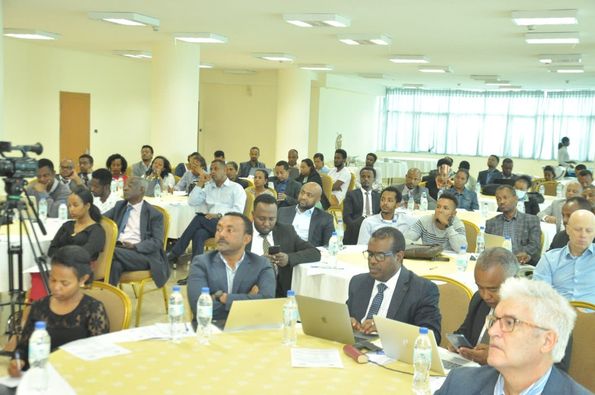Hosted by Addis Chamber, a high profile public private dialogue forum was convened to discuss on the window of opportunities and challenges of the digital trade and economy. Bringing together key stakeholders of the digital trade sector, the forum highlighted the current endeavor of the government in towards digitizing the economy.
It was also disclosed that the Ethiopian private sector role is growing paving the way for a bright digital future.
However the forum underlined the current challenges of digital infrastructure, internet penetration rate, digital literacy and use to remain very low.
Entitled with “Essential Regulatory Tools to promote Digital Transactions and prepare the Domestic ICT Sector for ACFTA Digital Trade” the forum disclosed that Ethiopia’s regulatory environment for digital trade has not yet been formulated entirely and existing laws are incapable of addressing issues sufficiently.
In his keynote address, Shibeshi Bettemariam, Secretary General of Addis Chamber, commends the current endeavor of the government in putting out new legislations on digital finance, electronic transaction, digital signature, communication services, he however urges for more needs to be done to create a regulatory environment that enables e-commerce to flourish.
Preceding the keynote address, experts from the ICT sector made briefings concerning the current engagements of the government in introducing new legislatives, laws and strategies to promote digital trade in Ethiopia.
Those briefings also include the existing challenges for digital trade that are attributed to impediments associated with unfriendly laws and policies tied with digital trade.
In his briefings to the panel, Bahiru Zeinu , CEO , of Africom technologies, highlighted the need to be ready in digital trade to accommodate the ACFTA.
Some of his recommendations include the need to make ready a standard and competitive product and services that can be operational in Ethiopia and other parts of Africa, the need to promote knowledge and skill in international marketing, securing international standards such as ISO and the likes, developing the cultures of collaboration and partnership among others.
Abyot Bayou (PhD), senior advisor to Minister of Innovation and Technology on his part listed out major challenges that need to be addressed for effective digital trade and economy. Some the challenges, the advisor mentioned include data privacy and security concerns, Intellectual property protection issues, consumer protection challenges and unfair competition practices among others.
He however emphasized on the need to develop new laws and regulations, the need to harmonize laws with in and across borders, sstrengthen and increase enforcement, educate consumers and businesses for an effective implementation of digital trade and economy in Ethiopia.
Entitled with Ethiopia’s Readiness for ACFTA Digital Trade, Sara Seifu, and senior ICT expert and digital trade at the ministry of trade and regional integration said that infrastructure development is being expanded to accommodate digital trade.
Accordingly access to infrastructure for digital trade as of 2021 has reached forty-four percent of Ethiopia’s population had access to electricity and one of the cheapest electric tariffs that encourages digital trade.
She however said that much has to be done to benefit rural communities to be part of the digital economy.
Following those presentations by experts of digital economy, participants of the panel forwarded their comments and concerns that have to be addressed by policy makers and key stakeholders of the sector.

